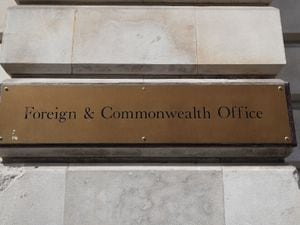Is Boris Johnson right to scrap the Department for International Development?
Labour and Conservative MPs from the West Midlands go head-to-head on the decision to merge two major Government departments.

Boris Johnson's decision to merge the Department for International Development with the Foreign Office has sparked an almighty row.
For some – including former Tory PM David Cameron – it is a huge mistake that will dent the UK's reputation overseas. Mr Johnson argues the move will allow funds to be better allocated now that Britain is reshaping its role on the global stage. Today Preet Kaur Gill, the Labour MP for Birmingham Edgbaston and Shadow International Development Secretary, and Mike Wood, the Conservative MP for Dudley South make the case for each side of the argument.
Preet Kaur Gill
Labour MP for Birmingham Edgbaston and Shadow International Development Secretary

The UK has had one the highest death tolls from Covid-19 in the world, millions of children are out of school and we face the worst unemployment crisis in a generation which could hit the West Midlands hardest.
The Government should be totally focused on getting on with its job of governing the country and steering us through the huge challenges we face.
Instead, last month, the Prime Minister decided to try and score some cheap headlines with a completely unnecessary large-scale Whitehall restructure that will see the world-leading Department for International Development (DfID) taken over by the Foreign and Commonwealth Office (FCO).
It’s clear that the Prime Minister’s rushed decision wasn’t based on evidence or any meaningful consultation but an obvious attempt to deflect attention away from his many failings in his handling of the coronavirus pandemic.
To do this during a pandemic tells us everything we need to know about where his priorities lie. The unnecessary DfID takeover is expected to cost at least £15 million to the British taxpayer, money that could have been better spent during this crisis paying for more than 600 qualified nurses for our region, or 2.5 million Covid-19 antibody tests. It is the wrong decision at the wrong time.
The Prime Minister’s plan has been roundly criticised by pundits and politicians from all sides including the Sutton Coldfield Conservative MP, Andrew Mitchell, and former Conservative Prime Minister, David Cameron, who all agree that it is a mistake that will significantly damage the respect and influence the UK has built up overseas.
The evidence is clear, getting rid of an independent DfID during a global pandemic is irresponsible, counter-productive and wrong. The DfID is consistently rated as the most effective and transparent department at delivering real value for money for British taxpayers, whereas the FCO routinely ranks far worse.
A global pandemic requires a global response and requires nations to cooperate and collaborate. The current crisis has shown that health emergencies, like the current coronavirus crisis we face, do not respect borders.
Even with our fantastic NHS the UK has still struggled during this health crisis, so imagine what it will be like for countries like Sierra Leone, where there are only 13 ventilators to support the whole nation, or in Somalia which has only 15 intensive care beds, or in Bangladesh where there is only one doctor for every 2,000 people.
The Covid-19 crisis has shown that no one is safe until we are all safe. At a time when we need the global health expertise of the DfID to drive the global response to Covid-19 and avoid further deadly waves, abolishing the DfID will undoubtedly put the lives of people here in the UK and those abroad at serious risk.
The British public are rightly proud of the role we play in supporting some of the world’s poorest and most vulnerable people whether it’s providing essential supplies to children in war-torn Yemen or personal donations to charities working in some of the hardest to reach places.
Without any plan in place and with little consultation, the Prime Minister’s decision signals a retreat from the global stage to the rest of the world, damages our soft power and, at a stroke, erases our hard-won moral standing and credibility in the world.
Mike Wood
Conservative MP for Dudley South

Britain has a proud record of working to eliminate extreme poverty in the world’s poorest countries.
I have seen incredible examples of projects funded by the UK, together with aid agencies from the United States and European countries, to ensure that disabled children in developing countries have access to school education – an opportunity that would have been out of reach just a decade ago.
Reducing unnecessary deaths in developing countries, and making sure that children everywhere have the right to an education, is not only morally right; it is unquestionably in our national interest economically and for our security.
Countries that escape extreme poverty are better customers for our businesses, reduce pressures on economic migration, and are less likely to be destabilised by forces that provide a fertile breeding ground for extremism and terrorism.
Creating a new Foreign, Commonwealth and Development Office will let us coordinate these different areas of British interest, making sure we punch our full weight internationally for the benefit of our citizens here at home and of our values overseas.
Much of our aid programme is delivered by our outstanding armed forces – whether it’s the life-saving work done by the Army in west Africa to eradicate Ebola, the Royal Navy’s ship RFA Argus helping British Overseas Territories deal with Covid-19 or the RAF plane carrying a World Food Programme field hospital to Ghana to help fight against coronavirus.
Working across Government increases the effectiveness of international development.
The United Kingdom is the only country to meet both the United Nations target of spending 0.7 per cent of national income on overseas development and the NATO target of 2 per cent on defence.
That will continue after the Government departments merge. The same experts and dedicated teams will still be working to help the world’s poorest, but the benefits will be magnified by having a single strategy for every country – bringing together security, prosperity, development and foreign policy to make sure the work funded by British taxpayers promotes Britain’s interests.
Many of our closest partners – including Australia, Canada and New Zealand – already take this sensible approach.
It has never been more important that we maximise our influence around the world by bringing together our international work in a coherent and effective way.
There was a time when the Labour Party would have focused on what we could achieve, rather than on departmental titles and internal empire-building.
October marks the 50th anniversary of the UN resolution where developed countries agreed the 0.7 per cent target for overseas aid. In 50 years, no Labour Government met that promise – not Harold Wilson, James Callaghan, Tony Blair or Gordon Brown.
This Government has kept our nation’s promise. Britain will continue to play our full part.
Bringing the different parts of our foreign and development policy together will help us to do that more effectively. We owe it to the world’s poorest – and to British taxpayers – to do exactly that.





